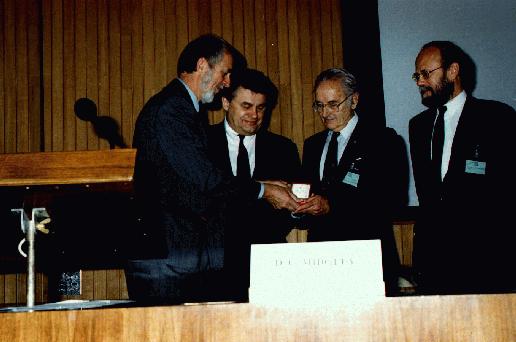International Hydrology Prize 1996

Pr D.C. Midgley receives the International Hydrological Prize from J. Rodda (IAHS President on the left), A. Szöllösi-Nagy (UNESCO) and Z. Kundzewicz (IAHS Editor on the right)
Professor Desmond Migley of South Africa was awarded the International Hydrology Prrize by Dr John Rodda during the Third UNESCO/IAHS George Kovács Colloquium. The citation included the following text :
"Professor Desmond C. Midgley was born in Durban and educated at Hilton College. He graduated BSc Civil (Engineering) at the University of Natal in 1934 and in 1957 was awarded a Doctorate for a thesis on the Surface Water Resources of South Africa. ln 1986 he was awarded an Honorary DSc (Eng) by the University of Witwatersrand.
He served 21 years in various divisions of the Department of Irrigation (now Water Affairs), interrupted by four years active service during World War II (mentioned in dispatches).
ln 1956 he was appointed to the chair of hydraulic engineering in the University of Witwatersrand. Following the disastrous 1959 floods in Natal he set up a research team which later became the Hydrological Research Unit (HRU). Under his direction the HRU published design manuals on flood hydrology in the 1970s and on water resources assessment in 1969 and updated in 1981. Mathematical models in wide variety were developed in the Unit for simulating the behaviour of river catchments, lakes, swamps, estuaries and flood plains, as weil as salinity fluctuations in various hydrological systems. Pertinent among these is the well-known Pitman Catchment Model. The publications of the HRU have been well received in rnany parts of the world and are widely referred to in South Africa. In many ways Professor Midgley must be regarded as the "Father of Hydrological Modelling" in South Africa.
Professor Midgley served for several years on the Prime Minister's Advisory Council and on the Water Research Commission. He was President of the South African Institution of Civil Engineers in 1968 and of the Associated Scientific and Technical Societies in 1974. He has received the Gold Medal Award of both bodies and was made an Honorary Fellow of the Civil Engineering Institution. He has for many years consulted in hydraulie engineering and hydrology for the mining houses, Eskom and Government departments and many consulting engineering firms.
Professor Midgley retired from the Chair of Hydraulic Engineering in 1977 but continued as full-time Director of the HRU until 1981 when he retired from the University and the Unit was disbanded. In 1982 he joined the consulting engineering firm, Watermeyer Legge Piesold & Uhlmann, as consultant, where he still practices.
In 1994 the Water Engineering Division of the SA Institution of Civil Engineers organized an international Symposium as a tribute to Professor Midgley, entitled "Fifty years of Water Engineering in South Africa".
Professor Midgley is currently project leader for the updating of Surface Water Resources of South Africa, the original six-volume report which was completed under his direction in the Wits HRU. The current five year project is being undertaken by a consortium of three consulting firms: Stewart Scott Inc., Steffen Robertson & Kirsten Inc. and Watermeyer Legge Piésold & Uhlmann and is being financed by the Water Research Commission. The revised and updated survey was published during 1995 and comprises seven volumes of text, data and information and six volumes of maps and GIS coverages.
The long years of South Africa's international isolation deprived Professor Midgley of many opportunities to develop an international profile. Nevertheless, Professor Midgley maintained international cross-pollination in the fields of hydrology and water resources engineering, by arranging and receiving visits from internationally renowned researchers, academics and practitioners in these fields and by serving as editorial panellist for a number of international journals.
Professor Midgley has been an exemplary exponent of applying basic hydrological principles to address real-world issues in a water-scarce environment such as that of southern Africa. He has a gift for reconciling the requirements of a site-specific hydrological study with regional hydrological patterns and trends. His vision that the immense spatial variability of rainfall-runoff conditions in the catchments of the southern African subcontinent can and must be overcome, has inspired the many post-graduate students, researchers and young water engineers who have benefitted from his mentorship during the past four decades."
